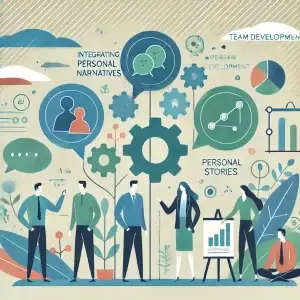No products in the cart.

Integrating Personal Narratives in
Team Development

Understanding and integrating personal narratives of team members can significantly enhance team dynamics and performance. Personal narratives—stories about who we are, our experiences, and our values—shape how we interact with others and contribute to a team.
Bringing these stories to the forefront can build deeper trust, foster cohesion, and unlock greater potential.
The Power of Personal Narratives in Team Development
Personal narratives influence how team members perceive themselves and their roles within the team. Humans want to be seen, heard, understood and accepted. These stories communicate who we are and shape behavior, communication styles, and interactions with colleagues. Sharing and understanding each other’s narratives allows team members to develop empathy, build trust, and enhance collaboration, leading to improved team dynamics and overall performance.
How Personal Narratives Enhance Team Dynamics
1. Building Trust and Psychological Safety
– Fosters a safe environment for open communication
2. Fostering Empathy and Understanding
– Promotes appreciation of diverse backgrounds and challenges
3. Enhancing Communication and Collaboration
– Provides insight into individual communication styles and preferences
4. Strengthening Team Cohesion
– Creates a sense of belonging and unity
Team-Building Exercises Incorporating Personal Storytelling
1. Group Experience/Goal
– Experience something together as a unit, preferably something that needs participation from each member to complete or understand
2. Life Map Exercise
– Team members create and share visual life maps highlighting significant events
2. Story Share
– Members take turns sharing personal stories related to specific themes
3. Personal Artifact Sharing
– Individuals share stories behind personally significant objects
4. Two Truths and a Lie
– Interactive exercise to learn interesting facts about team members
5. Hero’s Journey
– Members share stories of overcoming personal or professional challenges
Implementing Personal Narratives in Team Development
1. Create a Safe and Inclusive Environment
– Ensure respect and encourage active listening
2. Lead by Example
– Leaders should model truthfulness, vulnerability, and openness
3. Facilitate Regular Storytelling Sessions
– Incorporate storytelling into team meetings or dedicated sessions
4. Encourage Reflection and Dialogue
– Facilitate discussion and sharing of insights after exercises

Integrating personal narratives into team development enhances team dynamics and performance. Sharing and understanding each other’s stories builds trust, fosters empathy, and strengthens collaboration. Team-building exercises incorporating personal storytelling create a deeper sense of connection and unity, leading to a more cohesive and effective team.
Embracing the power of personal narratives allows teams to unlock their full potential and achieve greater collective success.
Contact Dr. Stone for a whole-person coaching chemistry call today!

